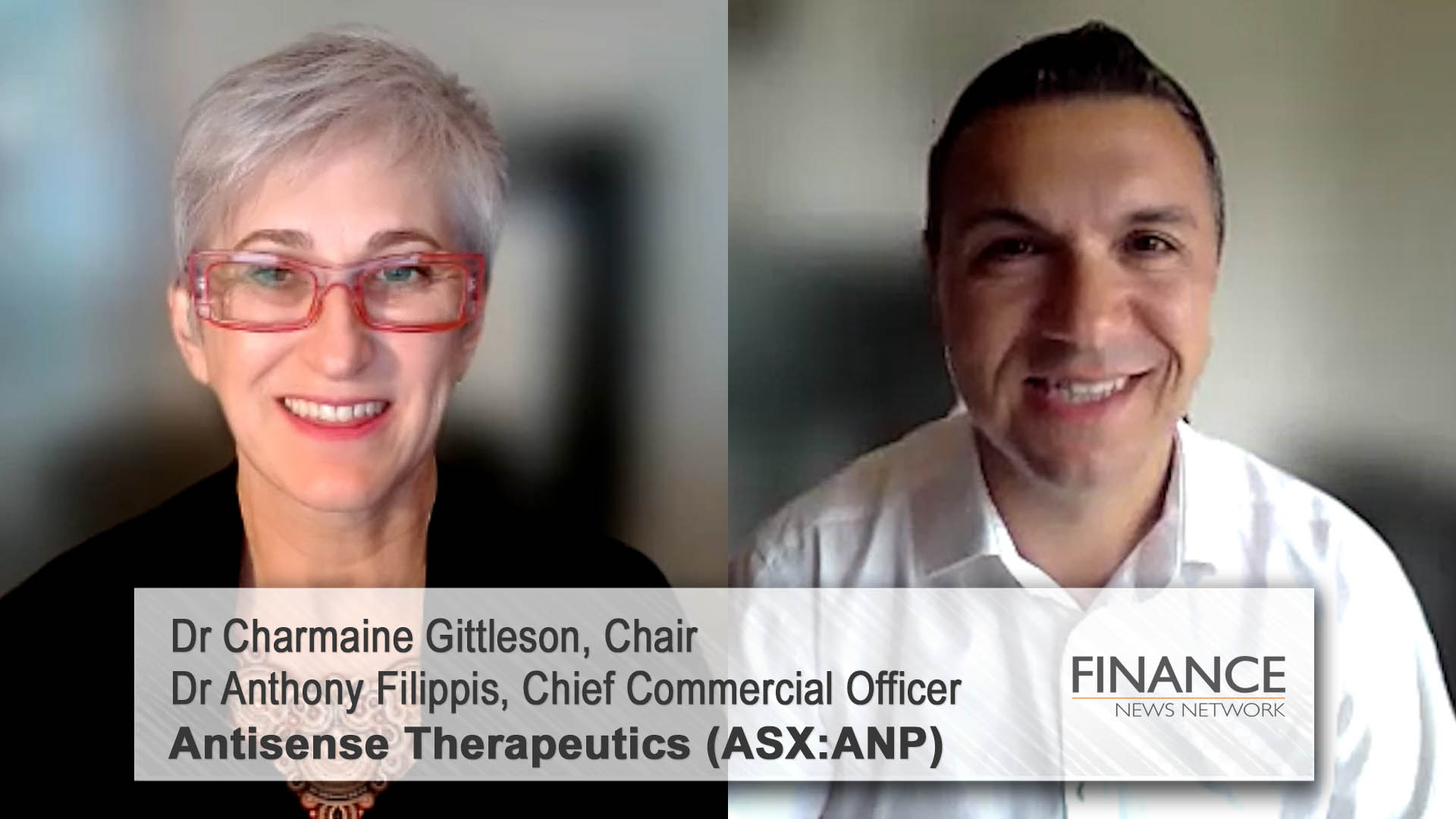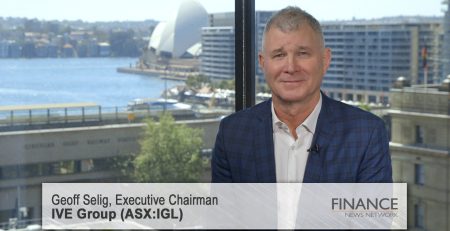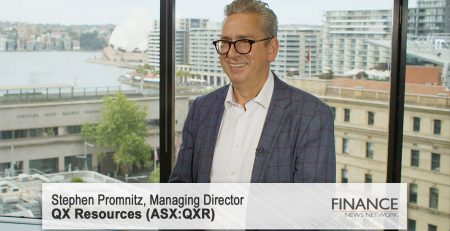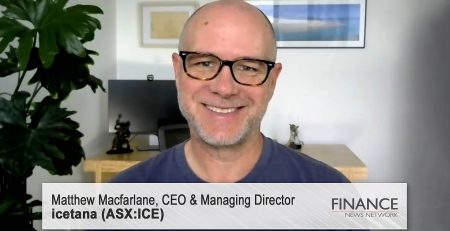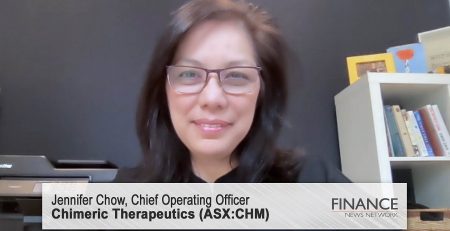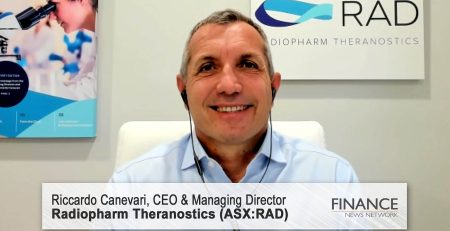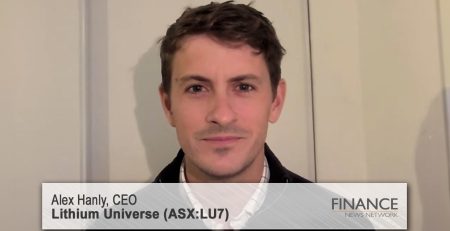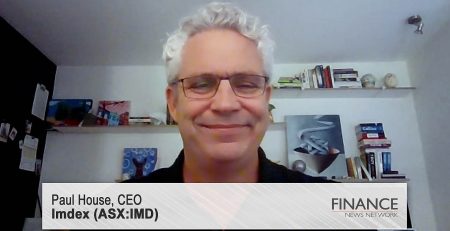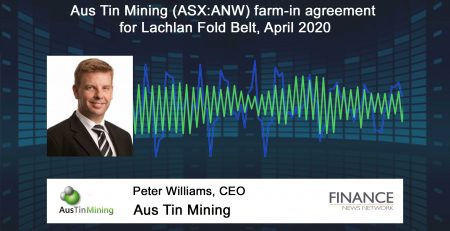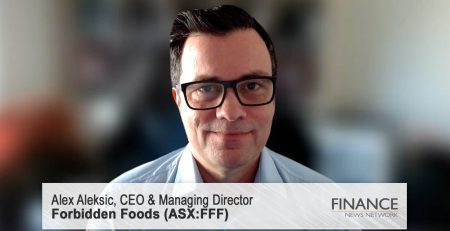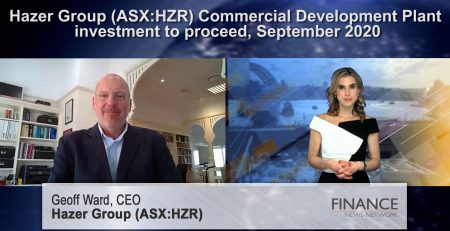Antisense Therapeutics (ASX:ANP) appoints Chief Commercial Officer
Antisense Therapeutics Limited (ASX:ANP) Chair, Dr Charmaine Gittleson, and new Chief Commercial Officer, Dr Anthony Filippis, discuss Antisense's progress, attracting new talent to the company, and what drew Dr Filippis to the role.
Tim McGowen: We're talking today with Antisense Therapeutics (ASX:ANP). It's got a market cap of around $57 million. The company is developing and commercialising antisense pharmaceuticals for large unmet markets in rare diseases. We have with us Dr Charmaine Gittleson, who is the company Chair, and Anthony Filippis, who is the company's new Chief Commercial Officer.
Now, before we start, a little background into the biotech sector, which over the last 12 months has moved from one extreme to the other — from spectacular fundraising success during the pandemic to a spectacular crash over the last 12 to 18 months. Investors are, however, starting to return to the more promising parts of the listed biotech sector. The upcoming JP Morgan conference in January could be seen as a potential catalyst for an uplift in sentiment across the sector. JP Morgan has certainly provided the sector with a boost in the past, and this will be the first time in a couple of years that attendance won't be restricted by the pandemic. It also appears that M&A activity is on the rise, with big drug-makers now sitting on almost $300 billion of cash and many, including Merck and Bristol Myers Squibb, need to refill their pipelines because of major patent expires in the second half of the decade. Of course, successful biotechs are usually bought out by big pharmaceutical companies, who have the financial muscle to fund large Phase 3 clinical trials and commercialise successful treatments. Overnight, for example, Johnson & Johnson said it struck a deal to buy heart pump maker Abiomed for $16.5 billion in cash, a 50 per cent premium to the share price. The reality is, however, that it's been a very difficult sector over the last 12 months, and biotechs on the ASX have been no exception. Of course, healthcare and life science sectors aren't going away. It's literally the only industry whose intention is to save lives or improve the lives of people with critical illnesses. It's important work.
We have both with us today Dr Charmaine Gittleson, as I said, and Dr Anthony Filippis, with us today, and they can help us get more insights into Antisense, the sector, and the US industry dynamics.
Anthony, welcome to the network. Charmaine, nice to see you again. Thanks for your time.
Dr Charmaine Gittleson: Thanks, Tim.
Tim McGowen: Now, as we just discussed in our intro, it's been a really tough environment for biotechs and the industry as a whole, both here in Australia and offshore, of course. What are your thoughts on Antisense's progress over the last 12 months?
Dr Charmaine Gittleson: Look, we have made progress. I know that the progress that's been made has not been reflected in the share price, and that has affected particularly retail investor sentiment. I'm very aware of that. It concerns me. But in terms of the actual progress we've made as an organisation, I think importantly what we've been able to do is find a way to move forward and to move back into the clinic. And a lot of effort has gone into, this year, trying to access capital in the markets, and while there is some capital available, the structures, the deal structures, almost require you to sell your soul. Deep discounts required in order to access capital. And we've not felt that that's been in the best interests of the shareholders. So we've worked through a strategy of how we can utilise the funds that we have at our discretion to use them to get ourselves back into the clinic. That's the most important thing. It's going to be the data from the patients, from the boys, that is going to be what we can leverage. It really is going to make the difference.
Tim McGowen: Now, Anthony, you're new to Antisense. Can we start by talking a little bit about your background and follow by what originally attracted you to join the company?
Dr Anthony Filippis: Yeah, sure, Tim. So, obviously, I was CEO and MD at NSV (Neurosciences Victoria) since 2017. Prior to NSV, I've been an accomplished CEO and C-suite executive for over the last 25 years in the biotech space, both ASX-listed and private companies. I sit on a number of boards, have chaired committees as well. In terms of attraction to Antisense or what attracted me to the role, there was a lot of factors, clearly. I think not only personal growth, but I think also from a company perspective, they've got a late-stage asset in ATL1102. There's a few companies, obviously, that have got late-stage assets, but there's not many of them in the Australian market. So, I'm really excited about working with the Phase 2b-ready drug in ATL 1102 for DMD (Duchenne muscular dystrophy). And the other thing that also attracted me to the role was obviously the data that's been coming out regarding long Covid. I think a third of people with Covid go on to develop neurological complications. Some of those complications really are around inflammation of the brain and brain fog that goes with that. So I think there's, through the identification of these elusive biomarkers, there's a diagnostic and a therapeutic angle as well that I think can be looked at. So, I'm really excited about that opportunity as well.
Tim McGowen: Charmaine, putting aside industry dynamics for the moment, Antisense have their AGM coming up, and the company's putting in place a new employee share option plan post it's expiry, which expires in December 2022. Is this how you attract new talent — someone like Anthony, for example?
Dr Charmaine Gittleson: So, I wouldn't describe it as new, because it is the same employees share option plan. And, as you said, it expires in December 2022. It's something that gets renewed every three years, and as such, needs to go to an AGM as a resolution to be voted on. But, yes, it's very much standard to use options and shares to attract talent, and importantly to retain talent. And the important thing to note, though, even though management and directors come under an employee share plan, there's a subtle difference, not always appreciated. So, it's at the discretion of the board to issue shares and options to management, but it's not at their discretion to issue them to themselves. And so, if the board is to receive shares or options, it has to come forward as a separate resolution. So, separate to the one that we put forward now. Has to come forward as a separate resolution named for each director. And, as you'll see, there aren't any this year for named directors, and I don't believe that there were for last year. I'm a firm believer in the organization, performing, doing well, and then people being rewarded with shares and options. So, as a board, we've not put that forward for ourselves as a reward this year, but it is an important incentive, and it will be something that we will be using over the next year to attract people to the board and the organisation, and to retain our key talent.
Tim McGowen: Charmaine, included in the AGM is a resolution in regards to a new placement capacity, which appears to be fairly standard AGM procedure for a biotech. How can shareholders reconcile the employee share scheme and the placement facility?
Dr Charmaine Gittleson: It's a good question. And I know that the legalese language in there can be circuitous — quite tough to get one's head around. And certainly, over the years, it's taken me time. So, the placement is something that actually is there every year in an AGM for most organisations. And it's a facility that the ASX makes available. It's particularly useful to smaller organisations because it provides flexibility in financial management. So, that's why it's there. And we've had it each year. It's been passed each year. It's not something that is used for a share plan, what we were discussing beforehand, the employee share and options plan. It's completely separate from that.
Tim McGowen: And, Anthony, can you give us some examples of how you plan to leverage, use your previous experience in the world of biotechs, to kind of help Antisense achieve its goals moving forward?
Dr Anthony Filippis: Yeah, look, Tim, I guess I've been pretty fortunate throughout my career. Obviously, I've done many deals, and I think I've developed some really good contacts within the biotech, pharma and investment circles. So, I think I can bring all of those connections to Antisense, and hopefully some of those will play a crucial role in Antisense's development. I think one area that will be really important to ensure that Antisense achieves its goals is to really look at the US market and have a real focus on the US market, not only from a partnering perspective, but also from a capital markets perspective. And I think with a drug such as ATL1102 for DMD, that's where you're going to have to play. I think there'll be obviously a lot of discussion around what the best commercialisation plan will be in the US, and it may be that something like a potential listing in the US might be something to consider as well.
Tim McGowen: Thanks, Anthony and Charmaine, for your time.
Ends
Copyright 2022 – Finance News Network
Source: Finance News Network

